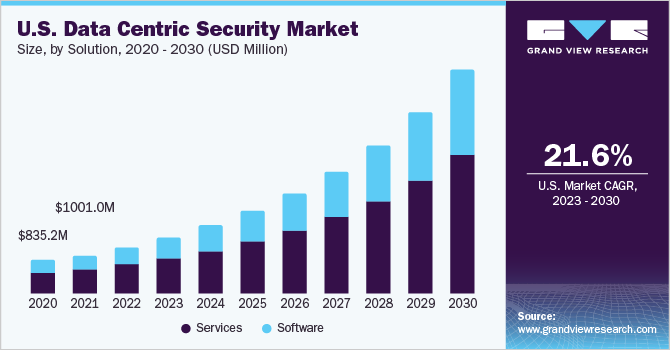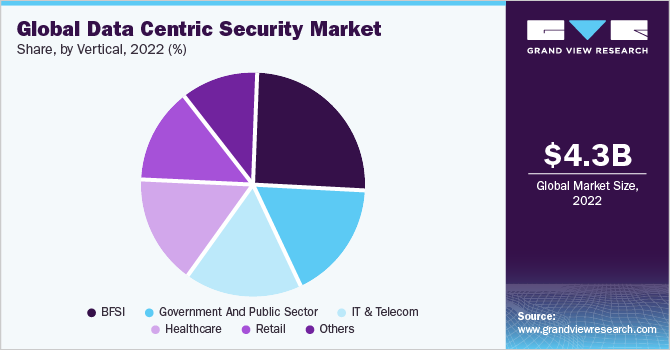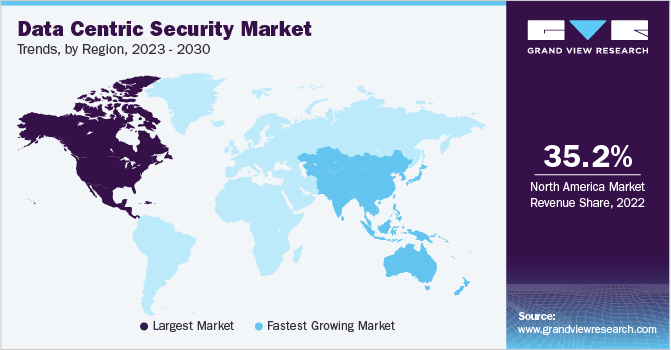
Data Centric Security Market Size, Share & Trends Analysis Report By Solution (Software, Services), By Deployment (Cloud, On-premise), By Enterprise Size, By Vertical, By Region, And Segment Forecasts, 2023 - 2030
- Report ID: GVR-4-68040-092-8
- Number of Pages: 100
- Format: Electronic (PDF)
- Historical Range: 2018 - 2021
- Industry:Technology
Report Overview
The globaldata centric security market sizewas valued atUSD 4.28 billion in 2022and is expected to grow at a compound annual growth rate (CAGR) of 24.2% from 2023 to 2030. The growing amount of data being stored and used for regular operations across various locations of businesses has emerged the need for a data-centric security approach to protect the datasets. The increasing importance of data centric security across organizations is mainly due to the insufficient security across network servers and business applications and the need to secure sensitive information shared by the administrator to the users across the organizations.

Network servers and enterprise applications have inherent security vulnerabilities, making the highly secured network subjected to internal threats. Employees accessing the organization’s databases and systems can share confidential access or data with other employees. However, they are not directly related to their external parties or job duties, having no authorized access, thereby expanding the threat of data spill.
This possibility of threat increases with deploying a hybrid environment across organizations where employees work remotely or in the cloud. This emerges the need for direct data protection to form more barriers that repel unauthorized data distribution. Data centric security technology secures data from threats attacking confidential information, sensitive data, and employee errors, which can be stolen or leaked by unauthorized parties.
Further, data centric is essential for dynamic data protection, as it helps businesses gain more flexibility in managing the networks and systems compared to traditional access controls. Implementing the least privileged access among organizations allows the administration only to provide the user access to sensitive information of their files without providing them complete access to every other data on the server. This framework is effective when access to different functional data within the department is prohibited to the user.
Moreover, data centric security must be layered on top of existing systems to avoid additional large-scale changes. It is required for companies to restructure their privacy policies with the evolution of their security landscape to create strong authentication and encryption approaches. The data centric security technology enables the organization to protect the company’s data from cyber threats and increase the availability of resources for other purposes.
The technology helps to protect data stored on hard disks, accessed, or manipulated by applications, and transmitted over the network. This benefit has enabled organizations to deploy data centric solutions across verticals, thereby driving the demand.
However, most organizations need to be aware of the importance of avoiding the vulnerabilities and risks associated with deploying data centric security solutions. This factor can hinder the growth of the market. Moreover, the high cost associated with implementing and deploying data centric security solutions can hamper the growth.
Some small & medium-sized organizations have budget constraints that make it difficult to deploy such security solutions. The need to invest in technology, infrastructure, and personnel skills makes the complete deployment process costlier, restraining the growth of the data centric security market.
Solution Insights
The software segment accounted for the largest market share of 63.3% in 2022. The growing cyberattacks and data breaches have enhanced the demand for the data centric security software market. High-profile incidents have made it essential for the industries such as BFSI, IT & telecom, and retail to deploy these software solutions. Further, the government's growing focus on strengthening data privacy and regulatory compliance across regions supports the segmental growth of the market.
服务部门预计将增长在英足总stest CAGR of 24.9% over the forecast period. The growing importance of implementing effective user access controls and assuring the safety and security of confidential and regulated information drives the demand for the data centric security services market. The data centric security services are essential to implement zero-trust, as it allows an organization to secure critical datasets in real-time and apply the least privileged access approach across different storages.
Deployment Insights
The on-premise segment accounted for a market share of 47.6% in 2022. Organizations with strict governance policies or highly regulated industries often prefer to control their data assets completely. The on-premise data centric security solution enables organizations to maintain their data within their physical infrastructure, providing complete control over data storage, access, and security. This is one of the factors expected to propel the demand for the on-premise data centric security market over the forecast period.
The cloud segment is expected to grow at a CAGR of 25.1% during the forecast period. The growing transfer of data storage to the cloud makes it vital for organizations to enhance their security methods, creating demand for the cloud-based data centric security market. Cloud-based data centric security solutions enable the organization to have strong access control, data masking, and encryption techniques to safeguard sensitive information. Further, the growing need for secured collaborations and data sharing within and across organizations over a cloud has fueled the demand for the cloud-based data centric security market.
Enterprise Size Insights
The large enterprise segment held the largest market share of more than 53.7% in 2022. The growing cyberattacks across large enterprises owing to huge data storage sets and resource access on these storage units have fueled the demand for the data centric security market. Cyberattacks' growing complexity and integrity have emerged in the need to deploy highly advanced cybersecurity approaches, such as data centric security solutions. These solutions give organizations enhanced visibility allowing them to monitor and enforce data protection policies effectively and detect and respond to security incidents timely.
中小企业(SME)段is expected to witness a CAGR of 24.8% during the forecast period. The growing awareness among small and medium enterprises to have strong cybersecurity approaches owing to the growing sophistication and complexity of cyber-attacks has propelled the demand for the data centric security market. The growing security attacks such as phishing, ransomware, and data breaches have made it essential for SMEs to secure their data assets and sensitive information by deploying data centric security solutions.
Vertical Insights
The BFSI segment accounts for the largest market share of 26.0% in 2022. The BFSI sector stores valuable and sensitive data, including personal information, financial details, and trade secrets. This makes the BFSI sector a prime suspect for cyberattacks. The growing sophistication and frequency of cyber threats have created a greater emphasis on deploying a robust data security approach, enhancing the demand for data centric security.

Further, deploying cloud infrastructure across the BFSI sector for improving scalability, operational efficiency, and cost-effectiveness has emerged with the possibility of introducing various security concerns. Overcoming this data privacy issue across cloud platforms is anticipated to generate huge demand for data centric security.
IT和电信领域是registe预期r the highest CAGR of 26.9% from 2023 to 2030. The increasing data volumes and end-user companies’ focus on providing secured access to data to their clients are driving the segment’s growth. The industry players are focusing on introducing industry-specific solutions to improve their brand positioning and increase their revenue stream. For instance, in March 2023, Cisco Systems, Inc. announced to launch new data center in Chennai; with enhanced security especially for its telecommunication industry clients, creating a positive market outlook.
Regional Insights
North America dominated the data centric security market in 2022 and accounted for 35.2% market share. The growing cyberattacks on government agencies, corporation, key infrastructure projects, and the population is anticipated to generate huge demand for data security solutions. This constantly changing and complex cyber threat infrastructure of North America has emerged the need for data centric security. The presence of several players, such as Microsoft, IBM, McAfee, and others in North America is expected to boost the growth. Furthermore, stringent government regulations such as California Consumer Privacy Act (CCPA), and General Data Protection Regulation (GDPR) have formed demand for advanced cybersecurity solutions to avoid legal and financial consequences, thereby surging the demand.

亚太地区预计将上升最快CAGR of 26.5% over the forecast period. The growing adoption of digitalization, machine learning, AI, and the Internet of Things (IoT) across areas of India, Australia, South Korea, and China has resulted in forming huge data assets which are required to be secured from vulnerable threats and risks such as ransomware, malware, data breaches, and others To overcome the cyber issues, the government is also imposing laws and regulations, such as the Information Technology Act, 2000 (ITA, or IT Act) of India, Cybersecurity Act of Singapore, and Security of Critical Infrastructure Protection Act of Australia, which is further creating demand for the data centric security.
Key Companies & Market Share Insights
The dominant players operating in the Data Centric Security market include Egnyte, Forcepoint, IBM, Imperva, Infogix, Informatica, McAfee, Micro Focus, Microsoft, NetApp, Netwrix, Orange Cyberdefense, Seclore, Symantec (now NortonLifeLock), Thales eSecurity, and Varonis. To broaden their product Solution, industry companies utilize a variety of inorganic growth tactics, such as partnerships, regular mergers, and acquisitions. For instance, in March 2023, IBM launched an IBM Cloud Data Security Broker, which is a cloud security solution designed to achieve tokenization, field-level encryption, and masking. The solution offers a data centric protection layer enabling users to encrypt, tokenize, and mast information at a row and column level. Some prominent players in the global data centric security market include:
Egnyte
Forcepoint
IBM
Imperva
Infogix
Informatica
McAfee
Micro Focus
Microsoft
NetApp
Netwrix
Orange Cyberdefense
证券交易委员会lore
Symantec (now NortonLifeLock)
Thales eSecurity
Varonis
Data Centric Security Market Report Scope
Report Attribute |
Details |
Market size value in 2023 |
USD 5.27 billion |
Revenue forecast in 2030 |
USD 24.01 billion |
Growth Rate |
CAGR of 24.2% from 2023 to 2030 |
Base year for estimation |
2022 |
Historical data |
2018 - 2021 |
Forecast period |
2023 - 2030 |
Quantitative units |
Revenue in USD million/billion and CAGR from 2023 to 2030 |
Report coverage |
Revenue forecast, company market share, competitive landscape, growth factors, and trends |
Segments covered |
Solution, deployment, enterprise size, vertical, region |
Regional scope |
North America; Europe; Asia Pacific; Latin America; Middle East & Africa |
Country scope |
U.S.; Canada; Germany; UK; France; Italy; Spain; China; India; Japan; South Korea; Australia; Brazil; Mexico; Argentina; UAE; Saudi Arabia; South Africa |
Key companies profiled |
Egnyte; Forcepoint; IBM; Imperva; Infogix; Informatica; McAfee; Micro Focus; Microsoft; NetApp; Netwrix; Orange Cyberdefense; Seclore; Symantec (now NortonLifeLock); Thales eSecurity; Varonis |
Customization scope |
Free report customization (equivalent to up to 8 analysts working days) with purchase. Addition or alteration to country, regional & segment scope. |
Pricing and purchase options |
Avail customized purchase options to meet your exact research needs.Explore purchase options |
Global Data Centric Security Market Report Segmentation
This report forecasts revenue growth at global, regional, and country levels and analyzes the latest industry trends in each sub-segments from 2018 to 2030. For this study, Grand View Research has segmented the global data centric security market report based on solution, deployment, enterprise size, vertical, and region:
Solution Outlook (Revenue, USD Billion, 2018 - 2030)
Solutions
Services
Deployment Outlook (Revenue, USD Billion, 2018 - 2030)
Cloud
On-premise
Enterprise Size Outlook (Revenue, USD Billion, 2018 - 2030)
Small and Medium-sized Enterprises
Large Enterprises
Vertical Outlook (Revenue, USD Billion, 2018 - 2030)
BFSI
Government and Public Sector
Healthcare
IT and Telecom
Retail
Others
Regional Outlook (Revenue, USD Billion, 2018 - 2030)
North America
U.S.
Canada
Europe
UK
Germany
France
Italy
Spain
Asia Pacific
China
India
Japan
Australia
South Korea
Latin America
Brazil
Mexico
Argentina
Middle East & Africa
UAE
Saudi Arabia
South Africa
Frequently Asked Questions About This Report
b.The global data centric security market size was estimated at USD 4.28 billion in 2022 and is expected to reach USD 5.27 billion by 2023.
b.The global data centric security market is expected to grow at a compound annual growth rate of 24.2% from 2023 to 2030 to reach USD 24.01 billion by 2030.
b.Software dominated the data centric security market with a share of 63.3% in 2022. The growing cyberattacks and data breaches have enhanced the demand for the data centric security software market. High-profile incidents have made it essential for the industries such as BFSI, IT & telecom, and retail to deploy these software solutions.
b.The key players operating in the data centric security market include Egnyte, Forcepoint, IBM, Imperva, Infogix, Informatica, McAfee, Micro Focus, Microsoft, NetApp, Netwrix, Orange Cyberdefense, Seclore, Symantec (now NortonLifeLock), Thales eSecurity, and Varonis.
b.The proliferation of digital technologies and the increase in cybercrimes has surged the risk of cyber-attacks and data breaches across organizations. This has emerged the demand for data centric security solutions to protect sensitive information across different locations within and across organizations.





